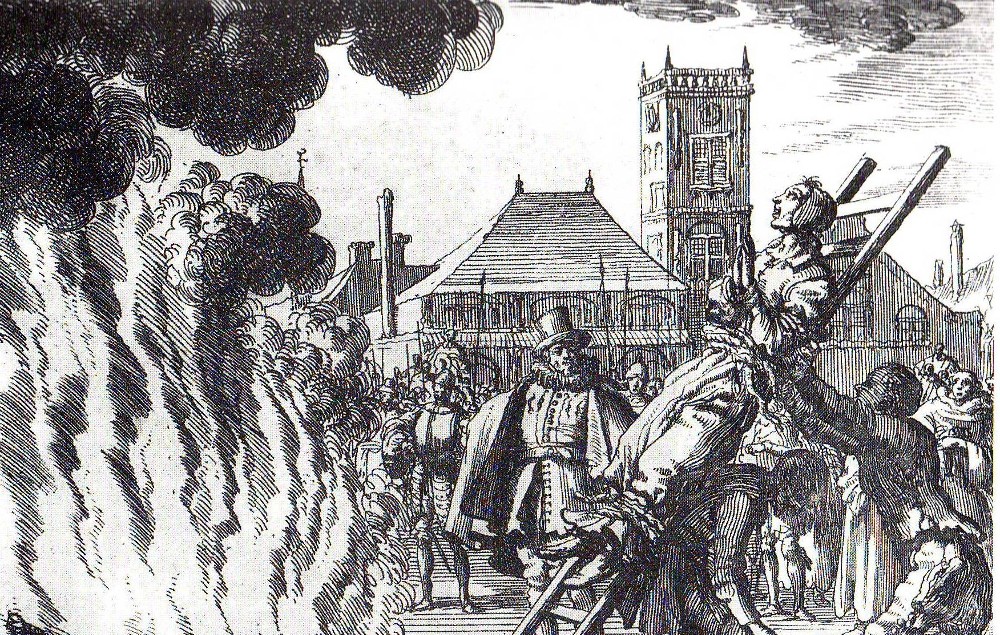The nation is entering a Galilean moment. Public and private authorities stubbornly pursue make-believe about race, ethnic loyalties, families, men and women, and civic adhesion. They deny the limits of nature.
It’s not the first time that human vanity has taken a run at truth and punished those who don’t fall into line.
To avoid prison in 1633, the astronomer and polymath Galileo recanted his defense of Copernicus’s discovery that the earth was not the center of the universe. He spent the rest of his life under house arrest.
“And yet it moves,” Galileo is reputed to have said later, and bitterly, silenced by haughty thought examiners.
Almost five hundred years after Galileo, quasi-religious frenzies flow from identity politics to grant Inquisitors the exclusive right to define “appropriate behavior” and “hate speech,” challenging freedom of conscience and nature itself.
The supernatural proposition that trans men and women are “born with the wrong chromosomes” and suffer this condition because they say so is a concept as false as geocentrism, only more obvious.
Yet passionate clerisies in government, corporations and academe have staked their reputations on these illusions and fallacies. They do not intend to change their minds or relinquish power. So begins our contemporary Inquisition. Is that Ari Emanuel or George Soros in the mitered hat rustling in the crypt, as zealous acolytes wave algorithmic censers?
Amid 8 percent official inflation, soaring crime, border invasions, and the ongoing question of whether the Biden-Harris administration is deliberately sinking the nation, the federal penumbras of Roe disappear.
For the progressive faithful, Roe heretics in jubilation are too much to bear. The remand to the states is a fire bell in the night. The grim slide into the fascist abyss has begun, and the propagation of virtue needs an army. The Inquisitors don rainbow robes for Pride and Juneteenth holy days in the nation’s capital.
“Hate has become so common on the internet that, as a society, it’s kind of becoming normalized,” said Kamala Harris, launching a White House Task Force. “For far too many people, the internet is a place of fear.”
Harris failed to add that the greatest dread is among the shadowy catechizers, enforcers, and gray eminences who intend to close down the dissident right, squash the case against trans, and prohibit rival lines of thinking.
Is Franz Kafka or Thomas Pynchon writing the American Civil Liberties Union copy on gender rights? “Doctors Agree: Gender-Affirming Care is Life-Saving Care,” the credulous read. “Yet politicians are trying to come between trans youth and the care they need.”
The woke stand ready — and brave, for they are always brave — to redistribute moral value and denounce the resistant and sane. “Emotional hemophiliacs,” Bill Maher recently called their media chorus, shrieking maledictions.
Perhaps fortified with Adderall and antidepressants, radiant examiners derail corporate or school board meetings or academic symposiums. Watching college presidents and CEOs shiver and beg for mercy — do anything to avoid an auto-da-fé — excites them, and helps them to self-actualize.
On the other hand, many millions of Americans, normative in outlook and deeply attached to empirical thought, realize with horror that other citizens — maybe their neighbors or school principal — are not.
They read between the lines on demotic threats. Will the time come in certain jurisdictions where what belonged to pioneers, builders and makers is reimagined as stolen property? That old school, church, park, townhouse or farm is sitting on sacred, indigenous land. Time to squat and re-possess, just after the authorities defund the police?
Pragmatic America isolates, or tries to, to protect its assets, children, values, or peace of mind. Safe havens in states and counties removed from seedy and threatening keep looking better and better. Chicago’s primo investor and taxpayer, philanthropist Ken Griffin, gives up, moves his hedge fund to Miami. Who can blame him?
Facing this unsavory state of affairs, out of personal interest, common sense and public interest, the wise and the just, you might think, would work to engineer a better social model. An augustan elite — Thomas Jefferson’s natural aristocracy, of all backgrounds, a veritable melting pot — would step in and say, that’s enough. The nation’s polity, economy and culture are too important and accumulated Western knowledge is too precious to waste or ignore.
But the guardians are in Fiji this month windsurfing, so you’ll have to talk to their lawyers. Meanwhile, very busy deans, bishops, and admirals dance the intersectional hip-hop, proud of their gotcha tweets. Unlike those dreary portraits in the hallway removed last year during an anti-whiteness campaign, today’s public officers are fun people, and with it. Why, is that the assistant secretary of commerce doing a little rhumba number on TikTok?
America’s privileged might have shaped popular thought into something finer: to begin with, a civics that held the American constitution and cornucopia to be something unusual in civilization, something to protect and conserve. They might have remarked on the cruelties of the past and rights of the present, conveying this to the pliable, trusting young. But that didn’t happen. As Christopher Lasch pointed out more than a generation ago, the postwar elites chose easy virtue and adversarial hubris, the politics of theater and gesture, and self-love dressed up as caring.
The Inquisitors have elixirs for reprobates who “just don’t get it.” Tossing aside what was familiar and cherished, the new therapies are self-care, mindfulness, and wellness. For some, there’s atonement, and for others, redemption. Psychotropics and surgeries can fill the void, while electronic everything can guarantee the widest possible isolation — just ask Siri or Alexa.
If electronic simulacra prove more appealing than the real thing, then family and community, social trust and rules of nature will continue to atrophy, along with coherent politics. Extracting the nation from the electronic codex of ruin and its Inquisitors will challenge society going forward, and will be impossible if the media subsume the message.
Nonetheless, tens of millions of Americans of a relatively wide band — in terms of assets, geography, and demography — remain attached to law, work, and respectable behavior. Their instincts keep them in touch with what is.
They contest the solemn impositions of the fantastic and false. “And yet it moves,” they say under their breath, seething at today’s social astrologies. Moreover, Galileo was vindicated — truth wins — and his tormentors were dispatched onto the ash heap of history. The same might happen, if we are fortunate, with our present-day arbiters of allowable thought.

























